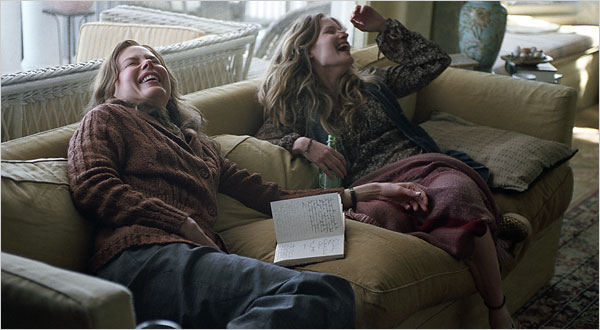Witty, insightful and unapologetically New York, are just a few ways writer-director Noah Baumbach has been described. Born and raised in Park Slope, Brooklyn, Baumbach made his writing and directing debut with Kicking and Screaming, immediately drawing comparisons to both Woody Allen and Whit Stillman. Through his seminal film, he’s received an Academy Award nomination for his original screenplay The Squid and the Whale, and garnered critical acclaim for Margot at the Wedding and his recent black-and-white salute to the French New Wave, Frances Ha. We here at Sound On Sight are huge fans of the filmmaker, so we decided to rank his films from favourite to least favourite. Here are the results.
Note: Since only one writer voted for Highball, we’ve decided to not include a capsule review.
****

6: Mr. Jealousy
After a debut Kicking and Screaming that was insightful, moving, and endlessly witty, Baumbach’s second feature was inevitably going to be a step down. Mr. Jealousy has its problems, most specifically in its overwrought narration, cloying use of irises, and tonal unevenness. The latter, though, also makes it one of Baumbach’s more fascinating efforts. This is not a perfect movie (in fact, it’s my least favorite of the director’s), but it’s one of immense ambition.
Eric Stoltz and Annabella Sciorra play a couple whose romance shows too many shades of Annie Hall and Chasing Amy, but is mostly pulled off by their fine performances and easy chemistry. He is beset by jealousy, she has trouble letting go of the past, and between them they are a bit of a mess. When the film focuses on their emotional hangups and tendencies for self-sabotage, if can be incredibly smart with a canny emotional acuity. However, Mr. Jealousy can’t decide from one scene to the next whether it is a romantic dramedy about psychological hangups or a free-wheeling farce about assumed identities (for complicated reasons, Stoltz pretends to be his friend Carlos Jacott in therapy, and eventually Jacott pretends to be him, only British). Ultimately, the film is an intelligent, engrossing examination of the way we hold ourselves back and are quick to point out the flaws in others while papering over our own. If it had shown a bit more tonal control and eased off slightly on the mid-’90s quirk, it might have become one of Baumbach’s best movies. As it stands, it is simply his most interesting failure, though it’s a charming and occasionally winning one.
Jordan Ferguson

5: Kicking and Screaming (1995)
In the long tradition of bourgeois American directors (see also Whit Stillman, Wes Anderson), Noah Baumbach sticks to what he knows best: the plight of the upwardly mobile. Rather that succumb to all that he knows as a writer, he makes it the burden of his characters in Kicking and Screaming, his acerbic debut comedy. The triumph of graduating becomes an invitation to listlessness for Grover (Josh Hamilton), a graduate who gets dumped by his girlfriend the night of commencement and moves in with his friends, none of whom are able to escape the comfort of school. Like Baumbach’s other films, he presents a prized American institution (be it marriage in Margot at the Wedding, or academia in The Squid and the Whale) as offering little solace for those fortunate enough to reap all of its benefits. In the “what the hell do I do now?” world of Kicking and Screaming, college provides the illusion of enlightenment, as personified by Eric Stoltz’s university sage and course journeyman, Chet, who recites that tired but true refrain: “How do you make God laugh? Make a plan.”
– Shane Ramirez

4: Margot at the Wedding
Though its main cast is mostly adult, Noah Baumbach’s Margot at the Wedding is no less a coming-of-age story than his effort two years prior, 2005’s The Squid and the Whale. Eschewing the maturation narrative of that film, and the new, awkward romance of Greenberg, Margot at the Wedding is a showcase for leads Nicole Kidman, Jennifer Jason Leigh, and Jack Black to bare their claws and play it catty as sisters and soon-to-be brother-in-law.
Darkly funny, shot at times as a psychological thriller, Margot features Black’s first semi-serious role, and one that he takes to its appropriately unraveled ends. Perhaps this is where the college graduates from Baumbach’s earlier effort, Kicking and Screaming ended up.

3: Frances Ha
The Greta Gerwig Charm Offensive continues unabated. Following her star turn in Whit Stillman’s agreeably eccentric Damsels In Distress, Gerwig once again toplines a quirky, affectionate comedy, this time sharing a writing credit with her director, Noah Baumbach. Where Damsels channeled golden-age Hollywood and vintage musicals, however, Frances Ha appropriates the look and feel of early-60s French New Wave in order to channel the restless energy of the character at its center, a shiftless but well-meaning late-twentysomething who finds herself perpetually in the wrong place and time. In much the same way that her work in Damsels complemented Stillman’s affectionately eccentric world-building, Gerwig is an excellent fit for Baumbach’s intimate, character-driven approach; Frances is easily the most relatable, sympathetic protagonist to grace a film all year. Perhaps the surest sign of the film’s winning qualities is that once the credits roll over the film’s final image, revealing the significance of its title, we’re far from ready to leave Frances and her adventures behind. Gerwig and Baumbach’s creation could easily withstand an entire series of time-lapsed explorations, not unlike Truffaut’s Antoine Doinel saga
– Simon Howell

#2: Greenberg
Noah Baumbach tends to make movies about shockingly literate, infuriatingly misanthropic and completely maladjusted human beings who don’t ask for forgiveness nor invite even the slightest sympathy. However, that doesn’t make his films any less true to life, and perhaps the apotheosis of his disaffected malcontents is the titular character of Greenberg. Ben Stiller is incredibly committed to keeping Greenberg unlikable, as he travels to L.A. to housesit for his vastly more successful brother, has an abortive relationship with the subtly heartbreaking Greta Gerwig, and tries, maybe, to move past his own insecurities for long enough to become an actual human being.
Stiller is often at his best when forced to humanize a character that makes audiences bristle (think back on his career best work in The Royal Tenenbaums, and his Greenberg is equal parts insensitive and insecure, inconsiderate and simply incapable of expressing himself. There’s a small heartbreak (and a large amount of laughs) in watching this person struggle to be what he thinks the world expects of him, and when he fails and fails spectacularly, its hard not to root for him to get back up on that horse called life and try again. By contrast, Gerwig radiates emotion; while his disaffection stems from previous rejection, hers feels like an effort to avoid the potential for emotional harm. The stellar soundtrack and fantastic cinematography ground this film that manages to be both stimulating and hysterical. It’s a look at a man who demands that the world dismiss him, who rejects hope and even love as the spoonful of sugar masking a poison pill. He’s a vicious, petty, distasteful human being. And in the hands of the masterful Noah Baumbach, we love him anyway.
Jordan Ferguson

1: The Squid and The Whale
Riding the emotional vein somewhere between tension-filled sobs and bitter laughter, The Squid And The Whale is funny at times, but never comes in close for hugs and kisses. While in the stylization of Anderson’s movies, Baumbach creates scenes that feel straight from the agonizing pages of his own childhood life. It’s an unflinchingly raw and truthful look at a family splitting apart, and it seldom strikes a delicate note. Although it portrays adolescent emotional turmoil from the view point of adulthood, The Squid And The Whale still packs a painful blow to the heart.
Jeff Daniels’ pseudo-narcissist professor has-been ranked as the coldest and cruelest in a distinguished line of semi-charming characters scripted by Noah Baumbach or co-writer Wes Anderson—including Gene Hackman in The Royal Tenenbaums and Bill Murray in The Life Aquatic With Steve Zissou. In Baumbach’s deeply black comedy-drama The Squid And The Whale, Daniels plays a loudly bitter failure who spits joyless venom on a world that long ago denounced him, and he effortlessly tries to assert his fading sense of superiority by dividing the world (and his family) into intellectuals and philistines. There’s not a whole lot to like about Daniels or most of the film’s faulty leads (like Jesse Eisenberg, who is an apple that didn’t fall far from its tree), yet Daniels maintains a certain charm throughout, and the New Yorker intelligence and 1980’s allure are all the more fascinating for their many rough edges and faults. Baumbach can obviously see through his characters’ toxic self-delusions, but his tender writing and directing engage a therapeutic affection for them anyways.
Chris Clemente

